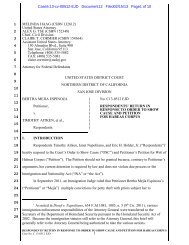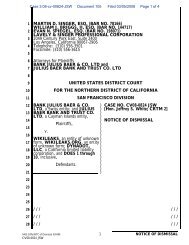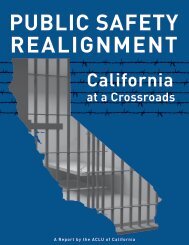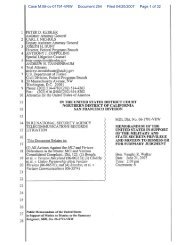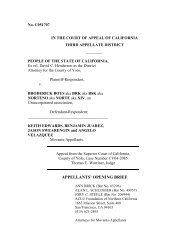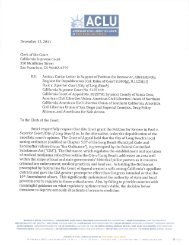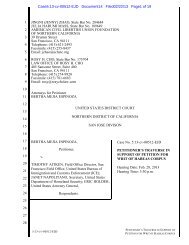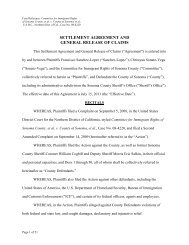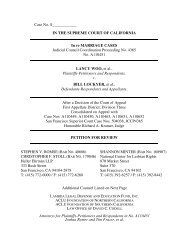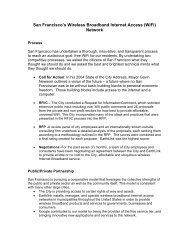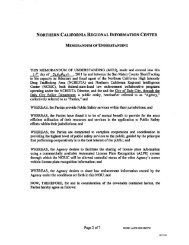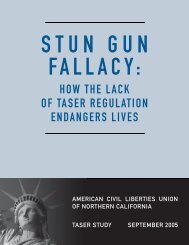file a brief - ACLU of Northern California
file a brief - ACLU of Northern California
file a brief - ACLU of Northern California
You also want an ePaper? Increase the reach of your titles
YUMPU automatically turns print PDFs into web optimized ePapers that Google loves.
1<br />
2<br />
3<br />
4<br />
5<br />
6<br />
7<br />
8<br />
9<br />
10<br />
11<br />
12<br />
13<br />
14<br />
15<br />
16<br />
17<br />
18<br />
19<br />
20<br />
21<br />
22<br />
23<br />
24<br />
25<br />
26<br />
27<br />
28<br />
information would have been broadcast by a user to the general public. But the user has every right to<br />
expect that the details surrounding her internet reading habits, particularly those revealing intimate<br />
associations, see supra at pages 11-12, should remain private.<br />
The fact that the information sought is in the possession <strong>of</strong> Twitter, a third party, does not<br />
mean that Twitter users lack a reasonable privacy expectation. Cf. Smith v. Maryland, 442 U.S. 735<br />
(1979) (installation <strong>of</strong> pen register to collect telephone numbers dialed does not violate Fourth<br />
Amendment rights <strong>of</strong> telephone customers); United States v. Miller, 425 U.S. 435 (1976) (account<br />
holder lacked Fourth Amendment interest in bank records created and maintained by bank in course <strong>of</strong><br />
financial transactions). The federal “third-party” doctrine does not apply in these circumstances is<br />
and, in any event, is not the law in <strong>California</strong>.<br />
The doctrine does not apply to the portions <strong>of</strong> the subpoena that seek private communications<br />
such as Direct Messages and protected tweets. This is so because the third-party doctrine has never<br />
applied when the government seeks the content <strong>of</strong> communications. In Katz, the government attached<br />
a listening device to a phone booth to intercept and record phone conversations; the Supreme Court<br />
found a search, 389 U.S. at 353, even though callers used the telephone company to transmit their<br />
conversations. “Letters and other sealed packages are in the general class <strong>of</strong> effects in which the<br />
public at large has a legitimate expectation <strong>of</strong> privacy,” United States v. Jacobsen, 466 U.S. 109, 114<br />
(1984), even though senders use the post <strong>of</strong>fice or a delivery service to transmit them.<br />
Nor does the third-party doctrine apply to private account information (such as “Log Data”),<br />
which is transmitted passively and involuntarily by the user. See United States v. Jones, 132 S.Ct.<br />
945, 957 (2012) (Sotomayor, J., concurring) (doctrine is “ill suited to the digital age, in which people<br />
reveal a great deal <strong>of</strong> information about themselves to third parties in the course <strong>of</strong> carrying out<br />
mundane tasks”). Twitter’s Privacy Policy expressly contemplates that its users retain a privacy<br />
interest in their account information and is not intended to interfere with users’ ability to object to<br />
government requests for information. See Twitter Privacy Policy (“nothing in this Privacy Policy is<br />
intended to limit any legal defenses or objections that you may have to a third party’s, including a<br />
government’s, request to disclose your information”). 21<br />
21 https://twitter.com/privacy (last visited December 19, 2012).<br />
14<br />
CASE NO. 12025934<br />
APPLICATION AND [PROPOSED] BRIEF OF AMICI CURIAE ISO MOTION TO QUASH SUBPOENA BY PEOPLE TO TWITTER, INC.



